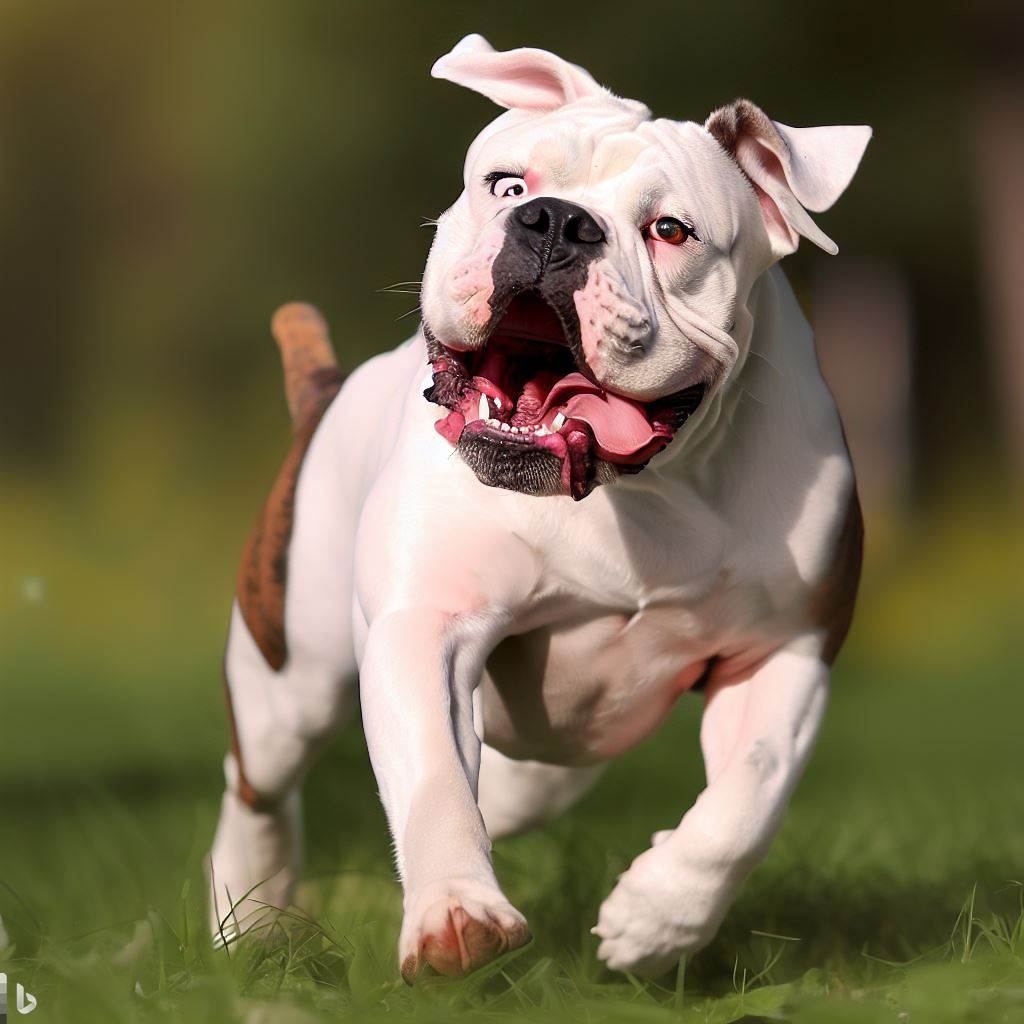
Unveiling the Truth: Do American Bulldogs Suffer from Health Issues?
The American Bulldog is a well-known breed that has been in existence for centuries. It is said that its origin can be traced back to ancient Greece, where it was used for various purposes, including hunting and guarding. They have a loyal, courageous, and affectionate nature towards their owners, making them great pets for families. However, like most dog breeds, the American Bulldog is prone to certain health issues that every owner should be aware of. One of the most common health problems in American Bulldogs is hip dysplasia. This occurs when the hip joint doesn’t develop correctly, causing pain and discomfort to the dog. It is a genetic condition that can be passed down from the parents, so it’s essential to ensure that the breeder you are purchasing from has screened their dogs for hip dysplasia. Although it can be managed with medication and therapy, it may require surgery in severe cases. Another health issue that American Bulldogs are prone to is allergies. They can be allergic to a wide range of things, including food, pollen, dust, and fleas. Symptoms of allergies in dogs include itching, hair loss, and skin infections. To prevent this, it’s essential to keep your dog’s environment clean and free of allergens. Also, it’s crucial to feed them high-quality dog food that doesn’t contain any allergens. Obesity is another health problem that American Bulldogs face. These dogs love to eat, and if they are not exercised regularly, they can quickly become overweight. Obesity can lead to other health issues such as joint problems, diabetes, and heart disease. Therefore, it’s essential to feed them a balanced diet and exercise them regularly to maintain a healthy weight. Lastly, American Bulldogs are also susceptible to skin issues. They are prone to developing skin infections, hotspots, and rashes. Skin problems can be caused by a variety of factors such as allergies, poor nutrition, and lack of grooming. To prevent and manage skin issues, it’s essential to keep your dog clean, well-groomed, and feed them high-quality dog food. In conclusion, American Bulldogs are a fantastic breed to have as pets. However, they are not immune to certain health issues that owners should be aware of. As a responsible owner, it’s essential to keep your dog healthy by providing them with a balanced diet, regular exercise, and proper grooming. It’s also crucial to take your dog to regular check-ups with the vet to detect any underlying health issues early. By doing this, you can ensure that your American Bulldog lives a long and healthy life.
Top Health Concerns for American Bulldogs: What You Need to Know
Like any other breed, American Bulldogs are prone to certain health issues. One of the most common health concerns is hip dysplasia. This condition occurs when the hip joint doesn’t form properly, causing the dog to experience discomfort and pain. Other joint-related problems include elbow dysplasia and osteoarthritis. These conditions lead to decreased mobility and can cause chronic pain if left untreated.
Another health concern that American Bulldogs face is obesity. These dogs have a hearty appetite, which can lead to overeating and weight gain, leading to other health problems such as heart disease, diabetes, and joint problems. Regular exercise and a proper diet can prevent obesity in your furry friend.
Another health issue that American Bulldogs face is allergies. These dogs are sensitive to different allergens, including pollen, dust mites, and food. Allergies can cause skin irritation and discomfort in the dog. If the allergies are left untreated, the dog may start scratching excessively, leading to skin infections and loss of hair. Keeping your dog clean and avoiding exposure to allergens is an effective way to manage these issues.
Dental health is another concern for American Bulldogs. Plaque and tartar buildup can cause gum disease, tooth decay, and bad breath. Regular teeth cleaning and providing your dog with dental chews can go a long way in preventing these issues.
Caring for Your American Bulldog: Preventing and Managing Health Problems
American Bulldogs are loyal and affectionate dogs that make great companions for families. However, like all living beings, they are prone to health issues. As a responsible pet owner, it’s your duty to ensure that your furry friend receives proper care and attention to prevent any potential health problems. One of the most crucial aspects of American Bulldog care is regular exercise. These dogs are highly energetic and require daily physical activity to maintain their physical and mental well-being. Daily walks, runs, or playtime in the backyard can help your American Bulldog burn off excess energy and stay healthy. Lack of exercise can lead to obesity, which can cause other health problems such as joint issues, heart disease, and diabetes. Another essential aspect of American Bulldog care is providing a balanced diet. Your furry friend’s diet should be rich in protein, vitamins, and minerals to support their growth and development. Feeding your American Bulldog a high-quality dog food that meets their nutritional needs is essential. Avoid feeding your dog table scraps or human food, as this can cause digestive issues and weight gain. Regular visits to the veterinarian are also crucial for American Bulldog care. Your veterinarian can provide vaccinations, perform routine check-ups, and detect any potential health issues early on. Early detection of health issues can prevent them from progressing and becoming more severe. Apart from exercise, diet, and vet visits, it’s essential to pay attention to your American Bulldog’s behavior and body language. Changes in behavior such as lethargy, loss of appetite, or excessive thirst can be signs of underlying health issues. If you notice any unusual behavior, it’s best to consult with your veterinarian immediately. In conclusion, proper care and attention can go a long way in preventing health issues in your American Bulldog. Regular exercise, a balanced diet, and routine vet visits are essential for your dog’s physical and mental well-being. As a responsible pet owner, it’s your duty to provide the best care possible for your furry friend.
Hip dysplasia, a common genetic condition in dogs, can cause significant discomfort, reduced mobility, and even early arthritis in your furry friend. The condition results when the hip joint fails to develop correctly, leading to instability, inflammation, and degeneration over time. While hip dysplasia is more prevalent in large breeds, it can affect dogs of any size and age. Fortunately, there are several ways to manage hip dysplasia and other joint issues in dogs. One of the most crucial steps is to maintain your dog’s weight within a healthy range. Excess weight can put additional stress and strain on your dog’s joints, exacerbating the symptoms and progression of hip dysplasia. Feeding your dog a balanced diet that meets their nutritional needs and monitoring their food intake can help prevent obesity and related health problems. In addition to proper nutrition, regular exercise is essential for managing hip dysplasia in dogs. Low-impact activities such as walking, hiking, and swimming can help strengthen the muscles surrounding the hip joint and improve your dog’s overall fitness. A physical therapist or a veterinarian may recommend specific exercises to target your dog’s specific needs and limitations. Supplements such as glucosamine and chondroitin can also have a positive impact on your dog’s joint health. These compounds work by supporting the cartilage and joint tissues, reducing inflammation, and promoting better joint lubrication. Some joint supplements also contain hyaluronic acid, omega-3 fatty acids, and other beneficial ingredients that can provide additional joint support. While there is no cure for hip dysplasia, early detection, and proactive management can significantly improve your dog’s quality of life. In addition to weight control, exercise, and joint supplements, your veterinarian may recommend other treatments such as pain relievers, anti-inflammatory medications, or even surgery depending on the severity of the condition. By working closely with your vet and providing your dog with the care they need, you can help them live a happy, healthy life despite hip dysplasia.
Allergies are a common issue that affect not only humans but our furry four-legged friends as well. Dogs, just like humans, can be allergic to a variety of things such as pollen, dust mites, certain foods, and even flea bites. Unfortunately, unlike humans, dogs cannot communicate their discomfort, which makes it even more important for us as responsible pet owners to recognize the symptoms of allergies and take the necessary measures to manage them. One of the most effective ways to manage your dog’s allergies is by keeping them clean. This means regular grooming sessions, which include brushing the coat, cleaning the ears, and trimming the nails. Regular baths are also recommended, especially for dogs that spend a lot of time outdoors or have a skin condition. Keep in mind that over-bathing your dog can strip their skin of natural oils and cause more harm than good. Therefore, it is advisable to consult with your vet regarding the appropriate frequency of bathing for your dog. In addition to regular grooming, avoiding exposure to allergens is crucial in managing your dog’s allergies. For example, if your dog is allergic to pollen, try to limit their time outside during peak pollen season. Additionally, you can use air purifiers and vacuum frequently to reduce the amount of allergens in your home. If your dog is allergic to certain foods, it is important to switch to a hypoallergenic diet that is free from the allergen. It is always best to consult with your vet before making any changes to your dog’s diet. It is important to note that allergies in dogs can be quite challenging to diagnose and manage. Some allergies may require medication or immunotherapy to alleviate symptoms. Therefore, it is always advisable to consult with your vet if you suspect your dog may have allergies. With proper care and management, you can help your furry friend lead a healthy and comfortable life.
Dental health is a crucial aspect of your dog’s overall well-being, and it is your responsibility as a pet owner to take care of it. Regular teeth cleaning and the use of dental chews can go a long way in ensuring that your dog’s teeth stay healthy and free of plaque buildup. It is recommended that you brush your dog’s teeth at least twice a week using a toothbrush and toothpaste made specifically for dogs. In addition to teeth cleaning, your dog’s diet plays a significant role in maintaining good dental health. Feeding your dog a balanced diet with the proper nutrients can help prevent tooth decay and bad breath. Some foods, such as carrots and apples, can also help clean your dog’s teeth naturally, so make sure to include them in your dog’s diet. Another way to keep your dog’s teeth healthy is to avoid giving them sugary treats and table scraps. Sugary foods can promote the growth of harmful bacteria in your dog’s mouth, leading to cavities and other dental problems. Table scraps can also be harmful, as they may contain bones that can get stuck in your dog’s teeth and cause injury or infection. Lastly, it is essential to schedule regular check-ups with your veterinarian to monitor your dog’s dental health and catch any potential problems early on. Your vet may also recommend professional teeth cleaning if your dog has significant plaque buildup or other dental issues. Overall, taking care of your dog’s dental health requires a combination of regular teeth cleaning, a balanced diet, and routine check-ups with your vet. By following these simple steps, you can help ensure that your furry friend’s teeth stay healthy and happy for years to come.

American Bulldogs are a breed of dog that has become increasingly popular and beloved by many. They are known for their loyalty, intelligence, and affectionate nature towards their owners. However, like any other breed, American Bulldogs have a few common health concerns that owners should be aware of to ensure their pet’s well-being. One of the most common health issues that American Bulldogs may face is hip dysplasia. This condition occurs when the hip joint does not develop properly, causing pain and discomfort in the affected area. To prevent this, it is essential to provide your American Bulldog with adequate exercise and a balanced diet. Regular visits to the veterinarian and providing them with joint supplements can also help manage this condition. Another common health concern for American Bulldogs is skin allergies. These allergies can be caused by various factors such as pollen, dust, or certain foods. To prevent skin allergies, it is recommended to bathe your dog regularly and keep their environment clean. Additionally, a healthy diet, regular grooming, and avoiding exposure to allergens can also help prevent skin allergies from developing. American Bulldogs are also at risk for a condition known as cherry eye. This occurs when the gland in the eyelid becomes inflamed and protrudes from the eye, causing discomfort and leading to potential eye infections. This condition can be corrected with surgery, but prevention is key. Regular visits to the veterinarian and keeping your American Bulldog’s eyes clean can reduce the risk of developing cherry eye. Overall, as an American Bulldog owner, it is important to be aware of these potential health concerns and take the necessary steps to prevent them. A healthy diet, regular exercise, and routine visits to the veterinarian can help keep your furry friend happy and healthy for many years to come. By properly caring for your American Bulldog, you can ensure that they live a long, healthy, and happy life by your side.














